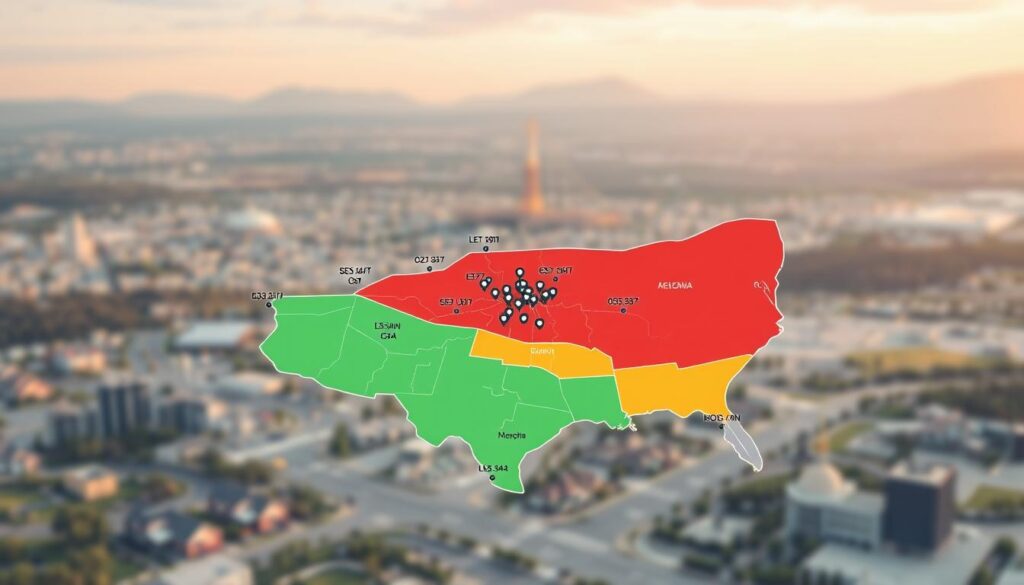Affiliate Disclosure
HVAC Guide Guys is a participant in the Amazon Services LLC Associates Program, an affiliate advertising program designed to provide a means for sites to earn advertising fees by advertising and linking to Amazon.
How Much Money Do HVAC Owners Make? Ever wondered what makes some HVAC businesses thrive while others struggle? The HVAC industry is full of opportunities for entrepreneurs to make a lot of money. But, the journey to success is not easy.

Looking into how much HVAC owners earn, you’ll find a wide range of possibilities. Some make just enough to get by, while others earn millions.
Several things affect how much you can earn. These include the size of your business, where you operate, how well you run things, and your management skills. Some HVAC pros earn less than $50,000 a year. On the other hand, the best ones can make over $500,000 annually.
To understand the money side of HVAC businesses, you need to know about market trends, what customers want, and how to grow. This guide will explain what affects your earnings in this exciting field.
Key Takeaways
- HVAC business income varies widely based on multiple factors
- Earnings can range from $50,000 to $500,000 annually
- Good management is key to making money
- Where you are affects how much you can earn
- Being efficient in your operations boosts profits
Table of Contents
Understanding HVAC Business Owner Income
Starting an HVAC business means looking at how much money you can make. Your earnings can change a lot, depending on several things. It’s key to really understand the money side of things.
HVAC owner salaries vary a lot. Small businesses make different amounts than big ones.
Salary Ranges Across Different Business Scales
There are a few main ways HVAC business owners can make money:
- Small local contractors: $60,000 – $100,000 a year
- Mid-sized regional businesses: $100,000 – $250,000 a year
- Large enterprise owners: $250,000 – $350,000+ a year
How much you make depends on a few important things:
- Where you are
- What services you offer
- How you run your business
- How much demand there is
To make more money, HVAC business owners can:
- Offer more services
- Use smart marketing
- Keep customers happy
| Business Size | Average Annual Income | Key Characteristics |
|---|---|---|
| Small Local Contractor | $60,000 – $100,000 | 1-5 employees, local market focus |
| Regional Business | $100,000 – $250,000 | 6-20 employees, multi-city operations |
| Large Enterprise | $250,000 – $350,000+ | 20+ employees, statewide or national presence |
Keep in mind, these are just possible earnings. Your actual income can change a lot based on your business and the market.
Breaking Down Company Size and Earnings
The size of your HVAC company is key to your earnings. Smaller companies usually make less money. But, bigger firms can make a lot more by growing smartly.
Knowing how company size affects revenue is important. Bigger HVAC companies have big advantages:
- More technicians can do more jobs at once
- They can handle more service contracts
- They can get better deals from suppliers
- They can serve more areas
As your team grows, so does your income. A solo operation might make $100,000 a year. But, a company with 5-10 technicians could make $500,000 to $1 million annually.
Your growth plan should be about steady growth. This means:
- Hiring skilled technicians
- Investing in training
- Building strong management systems
- Creating efficient processes
But, growth brings its own set of problems. Bigger teams need better management and more money for overhead. You need to plan well to keep your profits up as you grow.
Explore Our HVAC Shop
Looking for top-rated HVAC tools, parts, and accessories? Visit our shop and find the perfect solution for your needs.
Visit the ShopProfit Margins in the HVAC Industry
Understanding the financial side of an HVAC business is key for entrepreneurs. It helps them make the most of their hvac venture income. To be profitable, you need a smart plan for managing costs and income.
The health of an HVAC business depends on several important factors. These factors directly affect the financials of the business. Successful companies manage their costs well and keep their prices competitive.
Typical Operating Costs
Your HVAC business will face many expenses that cut into profits. The biggest costs are:
- Equipment and tool investments
- Vehicle maintenance and fuel
- Employee wages and benefits
- Insurance and licensing
- Marketing and advertising expenses
Net Profit Calculations
To figure out your net profit, you need to track all your income and expenses carefully. Profit margins in the HVAC industry usually range from 8% to 20%. The best businesses aim for the higher end of this range.
“Know your numbers. Successful HVAC business owners treat their financial statements like a roadmap to growth.” – Industry Expert
Industry Benchmarks
To see how your business is doing, look at these benchmarks:
- Gross profit margin: 40-50%
- Net profit margin: 8-20%
- Annual revenue for small businesses: $500,000 – $2 million
By managing your hvac business finances well, you can aim for the top of these profit margins. This ensures your business thrives and stays strong in the competitive HVAC market.
How Much Money Do HVAC Owners Make Based on Experience
How much money HVAC owners make depends on their experience. Starting an HVAC business, you might earn less at first. But, your earnings can grow a lot as you get more skilled.
In the first 1-2 years, HVAC business owners see a big growth. Your earnings could start at $30,000 to $50,000 a year. You’ll be building your reputation, getting clients, and learning important business skills.
- First Year: Learning and establishing business fundamentals
- Second Year: Expanding service offerings and client network
- Third-Fifth Year: Stabilizing income and increasing profitability
With 5-10 years of experience, your earnings can really jump up. Experienced HVAC owners can make $75,000 to $150,000 a year. This depends on the size of your business and your market position.
“Experience transforms your HVAC business from a startup to a profitable enterprise.”
Several things affect how much money HVAC owners make. These include:
- Technical expertise
- Business management skills
- Marketing effectiveness
- Local market demand
How well you adapt, learn, and improve affects your earnings in the HVAC industry.
Revenue Streams and Business Models
Successful HVAC businesses know that having different ways to make money is key. This helps them grow and stay profitable. By trying out various services and offers, your business can earn more.
HVAC contractors can earn more by using different ways to serve customers. A good business plan helps you find many ways to make money. This way, your business is less affected by market changes.
Residential vs Commercial Services
Choosing between serving homes or businesses can greatly affect your earnings. Each type has its own benefits:
- Home services have steady demand and loyal customers
- Business projects often mean bigger contracts
- Combining both can balance risks and earnings
Maintenance Contracts
Maintenance contracts are a steady source of income for HVAC companies. They offer predictable earnings and help build strong customer ties.
| Contract Type | Annual Revenue | Customer Retention Rate |
|---|---|---|
| Residential Maintenance | $500 – $1,200 per contract | 65-75% |
| Commercial Maintenance | $2,000 – $10,000 per contract | 80-90% |
Emergency Services
Providing 24/7 emergency HVAC services can really boost your earnings. People are willing to pay more for quick fixes during emergencies.
- Emergency call fees range from $100 to $500
- After-hours services cost more
- It makes your business seem reliable and quick to respond
By mixing these income sources, you can build a strong and profitable HVAC business. It meets market needs and customer wants.
Explore Our HVAC Shop
Looking for top-rated HVAC tools, parts, and accessories? Visit our shop and find the perfect solution for your needs.
Visit the ShopGeographic Location Impact on Earnings

Your HVAC company profits can change a lot based on where you are. The location you choose affects how much you can earn. Different places offer different chances and challenges for HVAC workers.
The weather where you are can also affect your earnings. Places like Arizona, Texas, and Minnesota need more HVAC work because of their extreme weather. Cities with lots of people usually have more steady work than rural areas.
- Sunbelt states offer year-round cooling services
- Northern states require robust heating systems
- Coastal regions demand specialized climate control solutions
Looking at how much people pay for HVAC services in different areas shows big differences. Think about these things when picking a place for your HVAC business:
| Region | Average Annual Revenue | Service Demand |
|---|---|---|
| Southwest | $125,000 | High |
| Midwest | $95,000 | Moderate |
| Northeast | $110,000 | High |
The cost of living and the local economy also play a part in how much you can earn. Cities with higher costs of living can charge more for HVAC services. Look into local competition, home growth, and business development to boost your business.
Choosing the right location can make your HVAC business 30-40% more profitable.
Smart HVAC owners adjust their business to fit the local needs. This helps them grow and stay ahead in their market.
Strategies to Maximize HVAC Business Profits
Running a successful HVAC business needs smart planning and financial management. You want to make your HVAC business profitable and stable. This means more than just providing services.
Profit optimization involves many strategies working together. These can turn your HVAC business into a financial powerhouse.
Pricing Optimization Techniques
Creating a smart pricing strategy is key for better income. Here are some important steps:
- Regularly check market rates
- Use tiered pricing for different services
- Focus on value-based pricing
- Make pricing clear and easy to understand
Operational Efficiency Improvements
Improving your operations can greatly help your finances. Focus on:
- Investing in new technology and software
- Optimizing scheduling and dispatch
- Teaching technicians about time management
- Lowering unnecessary costs
Marketing and Lead Generation
Good marketing can really boost your earnings. Digital marketing and targeted leads are essential for growing your customer base and profits.
Smart marketing isn’t about spending more—it’s about spending strategically.
Your HVAC business can grow a lot. By using these strategies, you can build a strong, financially successful business that stands out.
Managing Business Expenses and Overhead
Managing expenses is key to boosting hvac venture income and ensuring a good hvac owner salary. Smart financial planning can greatly affect your profits.
Controlling overhead costs needs a smart plan. Your HVAC business expenses include several areas that affect your earnings:
- Payroll and employee costs
- Equipment and tool investments
- Software and technology expenses
- Marketing and advertising budgets
- Vehicle maintenance and fuel
To boost your hvac venture income, cut down on unnecessary costs while keeping service quality high. Here are some cost-saving tips:
- Buy energy-efficient equipment to cut long-term costs
- Use cloud-based software for better expense tracking
- Get bulk discounts from suppliers
- Do preventative maintenance on tools and vehicles
| Expense Category | Typical Percentage of Revenue | Cost-Saving Opportunity |
|---|---|---|
| Labor Costs | 35-45% | High |
| Equipment Maintenance | 10-15% | Medium |
| Marketing | 5-10% | Low |
Pro tip: Always check your expenses and look for ways to make operations more efficient without lowering service quality. By managing overhead well, you can increase your hvac owner salary and make your business more stable.
Explore Our HVAC Shop
Looking for top-rated HVAC tools, parts, and accessories? Visit our shop and find the perfect solution for your needs.
Visit the ShopBuilding a Profitable HVAC Company Structure

Choosing the right business structure is key to making your HVAC business profitable. It also protects your investments. The legal entity you pick can greatly affect your earnings and financial future.
When starting your HVAC company, you’ll face several business structure options:
- Sole Proprietorship
- Limited Liability Company (LLC)
- S Corporation
- C Corporation
Each structure has its own benefits for managing your HVAC business finances. Sole proprietorships are simple but offer little legal protection. LLCs give more flexibility and protect your personal assets, which is important in the service industry.
“The right business structure can save you thousands in taxes and protect your personal assets.” – Small Business Administration
S Corporations can offer big tax benefits for HVAC entrepreneurs. They let you split your income, reducing self-employment taxes. This can help you make more money while following IRS rules.
When picking a business structure, consider these factors:
- Tax implications
- Personal liability protection
- Complexity of administrative requirements
- Potential for future growth
Talking to a financial advisor or tax professional can guide you. They can help choose the best structure for your HVAC business goals and revenue.
Growth Opportunities and Market Expansion
The HVAC industry offers great chances for contractors to grow their business. With changing technology and market needs, it’s key to plan for growth. This ensures long-term success.
Exploring Diversification Options
Adding new services can really help your business make more money. Think about these options:
- Smart home technology integration
- Energy efficiency consulting
- Renewable energy system installations
- Indoor air quality assessment services
Scaling Strategies for HVAC Businesses
To grow, you need a solid plan and smart investments. Focus on these areas:
- Building a strong online presence
- Training your technicians
- Using the latest technology
- Forming partnerships
Emerging Market Trends
Keep up with the latest trends in the HVAC world. The sector is expected to grow 7.5% each year until 2034. Look out for opportunities in:
- Green technology solutions
- Smart home automation
- Advanced energy management systems
- Predictive maintenance technologies
The future of HVAC businesses lies in adaptability and innovation.
Explore Our HVAC Shop
Looking for top-rated HVAC tools, parts, and accessories? Visit our shop and find the perfect solution for your needs.
Visit the ShopCommon Financial Challenges and Solutions
Running an HVAC business has its own financial hurdles. These can affect your earnings and business success. It’s key to know these challenges to stay profitable.
For successful HVAC business finances, you need a solid plan and active management. Many owners face common money problems. These can use up their funds and stop growth.
- Cash Flow Management: Develop a robust financial tracking system
- Pricing Strategies: Implement competitive yet profitable service rates
- Expense Control: Minimize unnecessary overhead costs
- Revenue Diversification: Explore multiple service streams
Three main areas often cause financial trouble:
| Challenge | Impact | Solution |
|---|---|---|
| Underpricing Services | Reduced Profit Margins | Conduct market research and adjust pricing |
| Poor Cost Management | Decreased Business Sustainability | Implement detailed expense tracking |
| Ineffective Marketing | Limited Customer Acquisition | Develop targeted marketing strategies |
To beat these challenges, take a proactive financial approach. Regularly check your finances, plan your budget, and learn about pricing trends. This can greatly help your HVAC business’s money health.
“Financial success in the HVAC industry comes from understanding your numbers and making informed decisions.” – Industry Expert
Invest in financial management tools and consider a business advisor. Also, keep learning about HVAC business finances. This will help you earn more and grow your business.
Conclusion
Exploring how much money HVAC owners make shows a bright future for entrepreneurs. The HVAC field offers great earning chances, with mid-level owners making up to $150,000 a year. Success comes from planning well, working efficiently, and managing your business wisely.
Boosting your HVAC firm’s income is possible with smart strategies. Try diversifying services, adjusting prices, and building strong maintenance contracts. Where you are, your skills, and staying up-to-date with trends also matter a lot.
The HVAC industry’s future is promising for those who act quickly. Focus on learning, using new tech, and putting customers first. Invest in marketing, skills, and growth to increase your earnings in this fast-paced field.
But remember, making money in HVAC is not just about technical skills. Your business smarts, customer ties, and smart choices are key. Stay updated, be adaptable, and offer top-notch service to grow your HVAC business.

